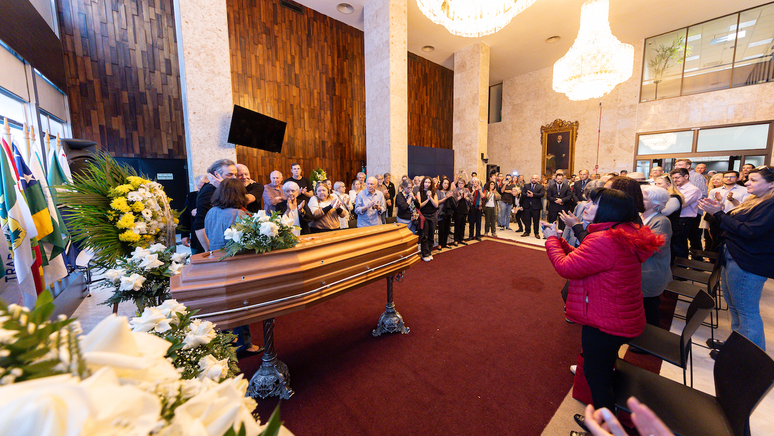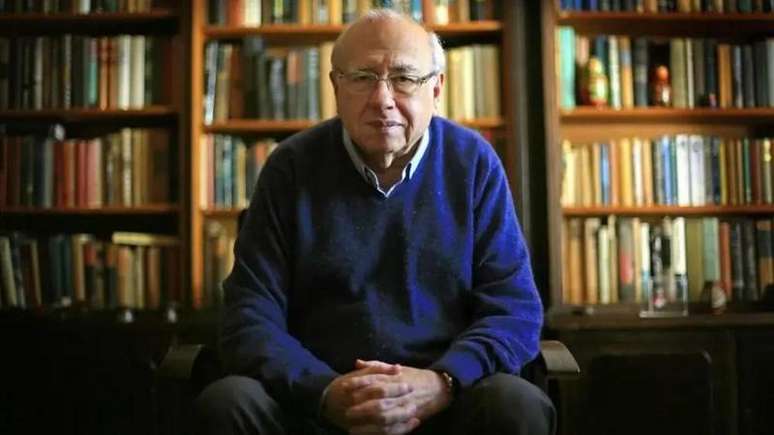Reports and dossiers preserved by the National Archive, many of which with the “reserved” stamp show that the military regime had a Curtty surveillance on Verissimo.
“Member of the left holiday”, “Leftist and conteging line”, “collaborates (…) in various newspapers and tabloids of the” Nanica press “, all of a subversive and largely widespread in the university environment”.
So the writer Luis Fernando Verissimo (1936-2025) was defined by agents and bodies of the Brazilian military dictatorship in official documents produced between 1970 and 1985.
The creator of the Brazil family died on August 30 at the Moinhos de Vento hospital in Porto Alegre.
Reports and dossiers preserved by the National Archive, many of which with the “reserved” stamp, show that the military regime had a Curtty surveillance on Verissimo.
In the oldest document of the series, a reference (type of report on an individual or a theme) of the Porto Alegre Agency of the National Information Service (SNI) to the central agency of the Agency in Brazilia, the then editorialist of the newspaper Folha da Manhã, by the state capital, is described in terms of cushioning.
“Luis Fernando Verissimo is the son of the writer Gaucho Érico Veríssimo, in the shade he has projected. He has a guaranteed column in the Folha da Manhã newspaper, of the journalistic society of Caldas, because of his social company, which promotes his young age, his young age. Text.
When the text was written on August 7, 1970, Verissimo was about to turn 34.
The document continues: “Ideologically entrust the” left holiday “to which you celebrate, with your mood and irony”.
He concludes: “It is a” Marxist “potential. It is admirable in the discredit campaign that the opposition groups move to the government and its acts, trying to discredit and demoralize”.
Therefore, the agent exhibits what qualifies from the “analysis” of the vigorous chronicles: “mixed between chronicles ranging from the international football team of the CE, his director Aldo Dias Rosa to his fat coach Daltro Menezes.”
“The name of the club has given itself to the connections that establishes the concept in which Brazil is seen abroad. The discontent attracted by the fans of this club, internship with the hint of infiltrated agents that must be limited to alleged and mentioned in the government.”
The “message”, underlines the agent, is clear: “ridicule the regime”.

The SNI report also lists “strengths” and “weaknesses” by Verissimo.
“Strengths: it is used to the wide acceptance of football to use it as a vehicle of your message. Use the launching technique of news in pills. Weaknesses: without consistency. Do not put the irony to the stern.”
In a report of the security and information division of the Ministry of Justice of 27 March 1972, Verissimo is mentioned only as “the son of the writer Érico Veríssimo”.
In facing the influence of the press on the attitude of the Gauchos on the military regime, the anonymous author of the document writes: “In the afternoon newspaper” to Folha da Tarde “, son of the writer Éico often paid censored in his cartoons, the government and institutional law n. 5.”
In 29 words, the text accumulates two errors: the professional address of the clock and the name of the newspaper (Folha da tarde), when he actually signed a column in Folha as Manhã, another diary of the Júnior Júnior journalistic company.
The journalist and writer Márcio Pinheiro, author of Write the mouse: Gis and the story of Pasquim (Matrix, 2022), states that, under the military regime, censorship, vigilance and coercion have reached all humorists, although in different degrees.
“Humor was very persecuted because it was the best way to say what was thought,” he says.
However, Pinheiro observes, Verissimo has impressed his production a brand, which distinguished him from the other humorists.
“One of the great virtues, which was also a great talent of him, was not to make an aggressive humor,” says the writer.
“When observing some cartoons by Millôr Fernandes and Henfil, it is clear that they wanted to hit the regime with a short stick,” says Pinheiro.
Very true, in turn, had a refined and sometimes lucid and delicate style, according to the journalist’s opinion.
“This allowed him, for example, to relate football and politics,” he has reason.
On September 3, 1975, a document attracted attention to the repercussion, in the Porto Press port, a series of recent scandals on corruption.
The text informs:
“Luis Fernando Verissimo, in his FM column [Folha da Manhã] of 30 August 1975 published the following dialogue:
‘D: Mr. Corrup says, how are you still losing?
A: For a nice sophism! I am corrupt for many years. Corrupt of the good. And the law knew it. But for the distraction he never took me! Obviously you can’t take me now. It would be a confession that had been omitted in the past. But I promised the authorities that I would have regenerated and regenerated me. For good money, of course. ‘”

Small opposition newspapers in the goal of agents
In addition to the main newspapers, the dictatorship also paid attention to the vast collaboration of Verissimo with small opposition newspapers, nicknamed “alternative press” or “Nanica”.
A confidential relationship of November 14, 1975 by Rio Grande Do on the Public Security Bureau analyzed the monthly risk of the newspaper, by Editor L&MM, founded the previous year and would have published some of the most famous works of Verissimo.
“A report by Luis Fernando Verissimo, son of Éico Versimo, is already inserted in 1 number,” says the text.
“The Epigrafe newspaper [Risco] It will probably be transformed into a biseptimanal, both because this type of Pasquim is very accepted among students, and because it has known professional employees or because it meets the political interests of the opposition “, adds the document.
In conclusion, he warns: “It seems that the largest concentration of communists, left and anarchists who are in action in Gaucho’s journalism have been collected there”.
In addition to Verissimo, another risk employee mentioned in the report is the graphic artist Edgar Vasques.
“Edgar Vasques, creator of RangyEven excluded from Folha da Manhã, a collaborator at risk, he had three books modified by the editors of L&MM, these publications are markedly left, even weaving direct and critical attacks on the revolutionary government, “says the author of the relationship.
In 1976, the Istoé magazine assumed very true as an editorialist, in a move that contributed to strengthening the sales of publication in Rio Grande do sul.
A document on June 3 of that year registers: “The new Istoé magazine has as its head of writing, Mino Carta, former director of writing the magazine Veja, and has as their collaborators the following writers of left trends: Millôr Fernandes, Luis Fernando Verissimo and Plínio Marcos.”
Responsible for the passage of Verissimo by Unknown, the journalist Mino Carta (1932-2025) died on September 2, in San Paolo, at the age of 91.
In some cases, surveillance has produced documents which, due to banality and irrelevance, seem on one of the chronicles of Verissimo.
An example is the report on the deviation of security and information of the Ministry of 28 November 1977, on a cartoon published in the Giornale Zero Hora.
Under the title SimilarityThe accusation shows an anonymous interlocutor who tells another:
“The international team looks like the current ministry.”
“As?” Asks for the second.
“True, a little surprise, with small cheerleaders,” says the first.
“And who appears more is the hawk.”
In a comment on the accusation, the Ministry of Justice states: “Under the pretext of criticizing the bad phase lived by the” Esportte Club Internacional “, from Porto Alegre/RS, tries to ridicule the performance of the ministries of the current government and, in particular, the person of the Minister of Justice”.
The owner of the justice folder, Armando Falcão, had in 1977 the same surname of the nascent star at the international midfielder Paulo Roberto Falcão.
The two – minister and player – had no relative.

Productions for the advertising market were even examined, in which he has worked for many years.
This is the case of information n. 749 of the Central Agency of the National Information Service (SNI) of 20 June 1977.
The document deals with a note issued by the Rhodia do Brasil Communication Advisory, which operates in the chemical and textile sector, as regards the omission of the name of Verissimo as a creator of a promotional piece for the company.
“It is interesting to note that the marginati [Verissimo]In its chronicles, on the basis of humor, it makes constant criticism of the government and the Brazilian regime but does not try to work for a multinational [Rhodia]”, Says the report, which did not identify the author.
The journalist and writer Rafael Guimaraens, who started working in the editorial offices in 1976, says that repression, censorship and official vehicles reported to the work of journalists and editorial offices after the edition of the edition n. 5 (AI-5), December 13, 1968.
“The big newspapers reproduced the dictatorship speech. There were obviously journalists who did a worthy job, but the newspapers themselves were officials,” he says.
The mission to inform with correction and quality was therefore in the hands of the Nanica press.
Very Verissimo Companion in the morning and also the goal of official surveillance, Edgar Vasques does not remember having witnessed his friendly friend for the siege of the regime.
Unlike Verissimo, Vasques had to respond to the investigation and proceedings established by the Federal Police after the regime’s authorities determined the seizure of an entire edition of the Pasquim newspaper due to the accusation of accusation Rangyin 1976.
“We were suspected of denigrating the image of Brazil abroad to the foreign power service,” he recalls.
“The boys thought it [a influência] It was China or the Soviet Union, but Jaguar [editor do Pasquim na época] He said it was Uganda, “Vasques amused.
Jaguar also died recently on August 24 at the age of 93.
Source: Terra
Rose James is a Gossipify movie and series reviewer known for her in-depth analysis and unique perspective on the latest releases. With a background in film studies, she provides engaging and informative reviews, and keeps readers up to date with industry trends and emerging talents.









